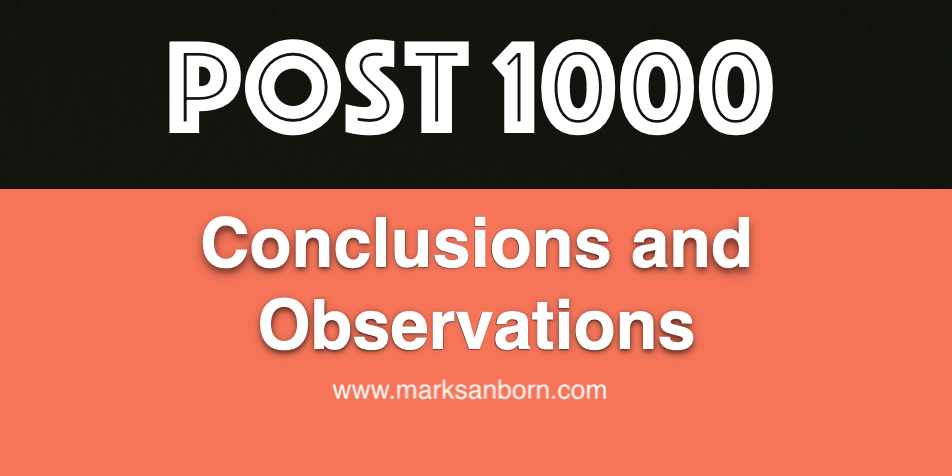WordPress tells me this is my thousandth blog post.
How do you write a thousand blogs? One at a time.
If you do anything long enough, the cumulative result can be big.
So what have I learned that might help you? I offer my conclusions and observations.
Conclusions
When I first started blogging, the primary driver was marketing: to showcase my thinking as a speaker and author. But it didn’t take long to realize that regular blogging also:
1. Made me think intentionally about subjects and messages.
2. Aided me in becoming a better writer through deliberate practice.
3. Helped me excavate my past experiences for lessons I could share.
4. Taught me to ask better questions.
5. And, finally, showcased my expertise (or exposed any lack thereof).
I’ve concluded that to be successful, you must focus. Few successful blogs are far ranging. More are specifically focused on a topic or area.
You need a reason to write one or 1,000 posts. The goal of my blog was and is the goal of my business: to provide ideas to help people be more successful in their lives and businesses. It is most gratifying to get feedback that an idea I shared in print or from the stage did just that and that has motivated me to keep going.
To be successful focus on what matters to you and learn to make it matter to others.
The best blogs make people think and act. Changing thinking is hard but changing behavior is harder.
Good writers sometime un-conclude a conclusion because they’re gotten new or better information and they admit it.
No matter how hard or well you proof-read, mistakes sneak in. You fix them whenever you find them.
The more you edit, the better the writing becomes.
If your writing bores you, it will bore your readers.
Observations
Blogging (the writing) is simple and straightforward. Getting noticed and read (the marketing) is very challenging and sophisticated. There was once a time that just writing a really good blog would get it shared and circulated. And while that can still happen, more often than not, it is the law of big numbers and clever marketing that gets a blog to go viral.
That means almost everything is hyperbolic. It isn’t just “good ideas for getting more customers” but “the 12 best ideas the help you crush the competition in getting the best customers ever.” Nobody is afraid to claim they know THE secret, the BEST ideas, the ONLY way, et al.
Which reminds me of biggest change in posting ideas in any form. I feel it was more fun to write before we moved into an age where simple ideas can be so threatening to others. There is someone on the planet who will take issue with the best written and most well intentioned of blogs.
Even innocent and noble ideas can be attacked by assigning malicious intent, whether there was any or not. We need to remember, ideas don’t attack people, people attack people.
I might dislike, disagree or feel contempt for an inaccurate or erroneous idea. But today people get apoplectic, not based on the veracity of the idea, but how they feel about the idea. Unreasonable people try to silence reasonable people. Don’t let them.
Experts and facts can be used to support any narrative so check both carefully before deciding what you believe to be true.
Disagreement is not hate if done with civility.
What You Can Do if You Like a Post
1. Click the like button.
2. Leave a comment of appreciation.
3. Post a comment that adds to the discussion.
4. Send an email and communicate directly with the author.
5. Share it with others.
6. Excerpt it and quote with attribution.
While I am optimistic life is uncertain. I don’t know how long I’ll keep writing or how long I’ll keep posting, but I don’t have any plans to stop soon. If I live long enough and keep at it, maybe I can write and post another 1,000. My highest hope is that they are all worthy of your attention and will help you in your journey.
Mark Sanborn is an award winning speaker and Leadership Expert in Residence at High Point University, the Premier Life Skills University. For more information about his work, visit www.marksanborn.com. He also teaches professional speakers and leaders how to increase their messaging and public speaking effectiveness. Learn more here.








